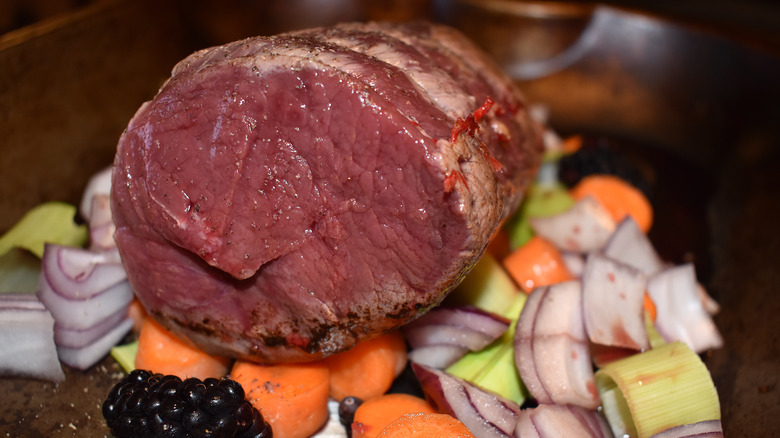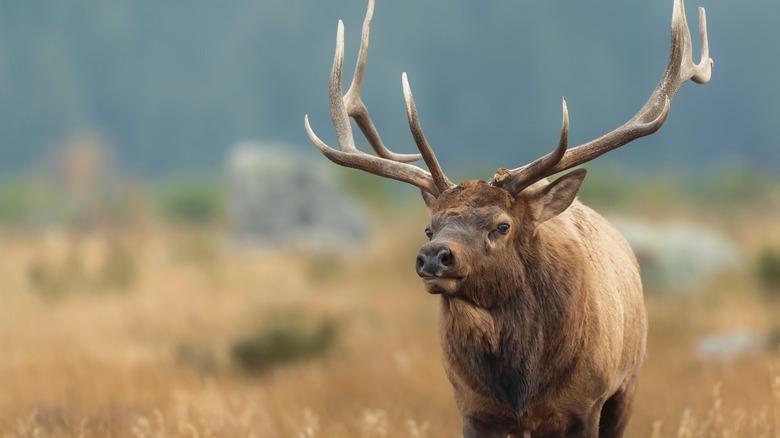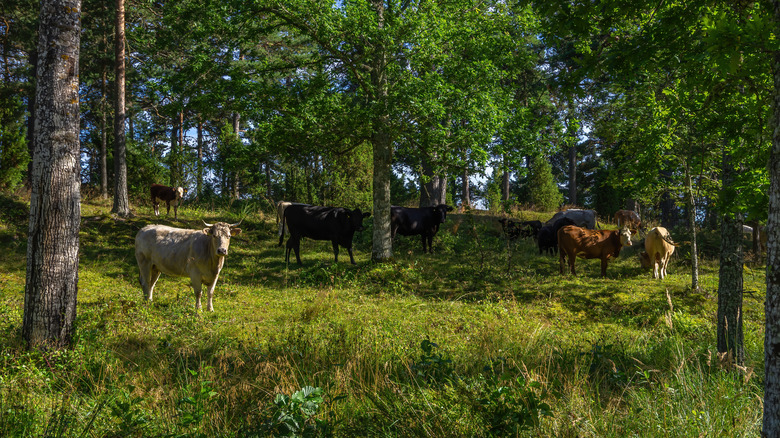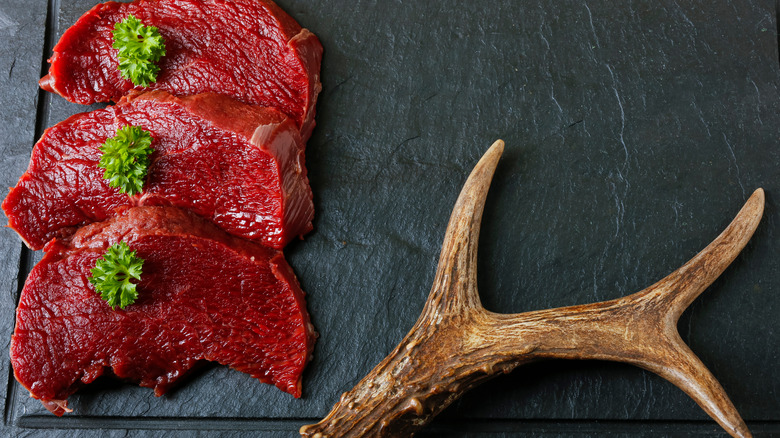Expert Explains What Gamey Meat Really Is And How To Cook It
You've probably heard the term "gamey" used to describe certain types of meat. You may have even tried venison or lamb yourself. But what does "gamey" really mean, and what makes these meats taste like that? Mashed recently reached out to chef Brad Wise of San Diego's Trust Restaurant Group and the acclaimed modern California steakhouse Rare Society to clear up some of the confusion. He gave us a few pointers on the best ways to understand and prepare some of these meats.
First, of all, what animal meats even get called gamey? There is something wild and unspoiled about the flavor that reflects where the meat comes from and how "gamey" animals live. "Gamey is typically a wild animal," Wise explained, "but these days they can also be farmed — but that's not that common. Gamey meats include boar, elk, moose, and venison ... Any animal that is raised in the wild or wild-like conditions, with free range on where they go, what they eat, and how they live, is classified as a gamey meat." He notes that the "the ones you're going to see most often would be lamb and venison. But really, there's a lot of different animals that fall under this category of gamey."
Game animals: they are what they eat
What does gamey taste like? Basically, this unique flavor comes from the particulars of these animals' environments. Chef Brad Wise helps us nail down the elusive quality of gamey meat. "It refers more to the flavor — a minerality that comes from what the animal eats during its life cycle," he says. Just like wine grapes take on the flavors of their environment (also known as their "terroir") animals do too, albeit in a different way.
As Wise noted, "Generally these animals are foragers, eating grasses, barks, nuts, whatever surrounds them and is edible in their environment — this will of course affect the taste." Animals accumulate minerals in their bodies over the course of their life cycles from eating those grasses and other foraged foods, and those minerals then add a layer of flavor to the meat that reflects region as well as species. Though many types of meat belong in the "gamey" category, they all have their own unique properties.
Flavor builders: diet and exercise
Chef Brad Wise went on to explain how minerals can affect the flavor of gamey meat like venison. "These minerals that you taste come from the grasses they eat, the water they drink, anything they consume," he says. "Gamey meats are incredibly varied ... So you can't really say all gamey meat tastes like 'this' or 'that' — look at each piece of meat, understand where it came from and what it might have eaten, and from there you can get a sense of how it's going to taste."
Of course, it's not only about minerals. Because wild animals also lead more active lifestyles, the texture of their meat also differs from their domesticated counterparts. Wise aptly described it as "more lean." "Some people would equate lean with 'tough,'" he adds, "but I don't think that's the case." Animals that produce gamey meat tend to have less fat and more muscle, which means they can be harder to cook right.
Lean meat doesn't have to be tough, but it's important not to overcook it. Wise recommends highlighting the flavor with simple but elegant preparation techniques. His accessible approach is a great place to start for cooks ready to dip their toes into the gamey meat universe.
Savoring game
When it comes to savoring and appreciating gamey meats, Chef Brad Wise has straightforward suggestions. His ideas make our mouths water: "For prized cuts like short loin or rib chops, I cook them simply, on the grill, serving it with a gastrique sauce or smashed yams or bitter greens." For Wise, these are wonderful comfort foods, and he even has a wine to go with it, "Pair it in the winter with a glass of Barolo — perfection in my mind."
But what about the more humble parts of the animal? That's where you can get creative. Chef Wise thinks they are perfect for jerky or sausage. "You can make it yourself, use different spices, flavors and rubs to really bring out the best flavor notes of each piece of meat you have," he says. "Another thing that's popular is to make sausages out [of] gamey meats — combining it with some ground pork shoulder or pork fat to add some richness — it's so good."
We may never think of "gamey" as a bad thing again.



